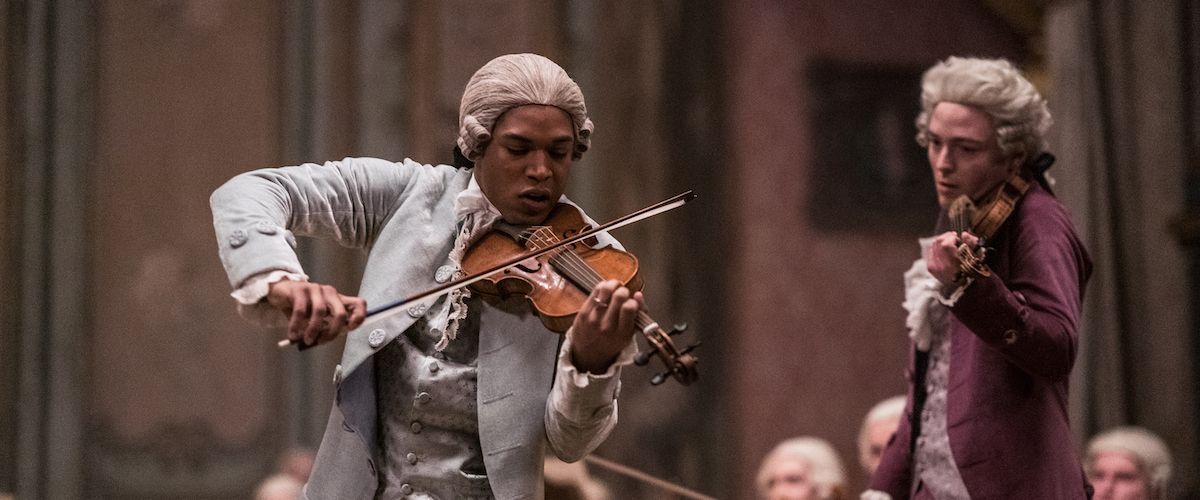Jonah Naplan June 19, 2023
The confident and cocky Joseph Bologne (Kelvin Harrison Jr.) is the handsome star of “Chevalier,” a film chronicling an 18th-century revelatory musical artist often overlooked by the public. He’s known as the first classical composer of African descent to have his impressive stack of work critically acclaimed globally. This film tells his story with poise, communicating everything we need to know about the man and his rise to fame, and adding some obviously fabricated but welcome clauses, too.
The first scene of the film is one example. A young and eager Bologne, played marvelously by Kelvin Harrison Jr., infiltrates a performance by an ambitious Wolfgang Amadeus Mozart, challenging the composer and conductor to a violin-off. For most, this is the first presentation of his talent that they’ve seen. In a wildly entertaining moment, perhaps one of the best in the entire film, Joseph shows off in such a way that causes Mozart to retreat, furious, while the young artist receives an uproaring appraisal from the audience.
“Chevalier” is a movie filled with competition, and artists trying their hardest to one up each other through a series of performances and potential promotions. Bologne, a man of color, segregated and mistreated by most he comes across, is not only fighting his musical opposers, he’s battling the racism that shields him from being heard. One major status symbol that all aspire to achieve is the approval of the Queen of France herself, Marie Antoinette (Lucy Boynton). Bologne receives her respect almost instantly, and much of the film is his fight to maintain it.
It helps that Joseph Bologne is not just a skilled violinist. He is also an impressive fencer and accomplished composer. In a key scene, Marie Antoinette offers him the most prestigious gig in the French musical world—conductor of the Paris Opera—but he is competing against a white opponent in a race to write a better opera, in order to gain the title. His blackness is working against him. He is not taken seriously, ridiculed, and voraciously threatened. He must work within the confines of his niche circle of trust to find a fitting lead for the opera. So Bologne offers the role to his more recent close friend, Marie-Josephine (Samara Weaving, giving a powerhouse performance), but her extremely white husband (Marton Csokas) forbids her to accept, claiming he doesn’t want his wife to perform “as a whore” in front of a group of spazzes. They had an arranged marriage, if you couldn’t tell.
The movie is a period drama, but it parodies the conventional beats those films usually follow, such as casually having romantic relationships outside of your courtship, being severely overprotective of your dignity, and the old-timey, “proper” language that has here been altered with the occasional expletive. Yet even as “Chevalier” concludes with a victorious ending, it still somehow manages to follow all of the same plot beats that it’s simultaneously satirizing. Namely Joseph’s romance with Marie-Josephine—a camaraderie that is spiky and virtuosic—but still predictable nonetheless. Likewise is the basic direction that “Chevalier” takes with Joseph’s relationship to his mother (an admirable Ronke Adekoluejo), who arrives in France shortly after the family patriarch (Jim High) dies.
The structure and tone of director Stephen Williams’ film is frustratingly conventional, stealing bits and pieces from other movies, and not really putting its own spin on them in a reasonable exchange. At an early age, Joseph was dumped by his father into a fancy French school, not knowing where to turn as a negro. Cinematographer Jess Hall uses basic lighting and shot design to portray Joseph’s loneliness in an unforgiving world.
“Chevalier” is saved by its entertainment value and excellent performances. Kelvin Harrison Jr. is the biggest stand-out, playing Bologne with the cockiness his character requires, but not so much that he becomes insufferable. Slowly making his way to embrace his blackness, Joseph is represented as determined, soulful, and headstrong; standing up to injustice, and standing for the common man who cannot. He has sharp chemistry with all the important women in the cast—romantically with Weaving, respectfully with Boynton, lovingly with Adekoluejo, and adversarially with Minnie Driver; a woman who wants to use Joseph’s skills to her advantage.
Bologne dares to defy all law and order, putting together a triumphant symphony that incites a riot, from both supporters and assailants. Notice how in this scene, Joseph has removed his powdered wig, standing in front of an audience for the first time bearing only his dreadlocks. “Chevalier” is making a bold statement here, and in all the moments before it cuts to black. Injustice is everywhere.

